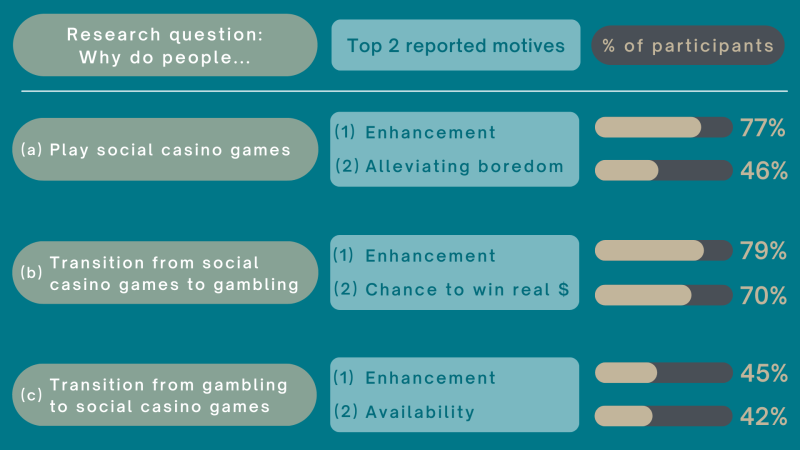Read the original article on The Basis website HERE.
By Caitlyn Matykiewicz, MPH
Social casino games have become very popular during the past decade. Typically played on mobile devices, these online games are connected to social networking sites, allowing players to see their scores on leaderboards and share results with their friends. Social casino games resemble gambling activities like slot machines (aka electronic gambling machines [EGMs]), even including similar sounds and offering in-game purchases or microtransactions with rewards of virtual points. Because they are free to play and the player cannot win any real money from the outcome, social casino games are not currently considered gambling. However, people who play simulated gambling games, such as social casino gamers, might be more likely to experience gambling problems. This week, The WAGER reviews a study by Hyoun S. Kim and colleagues that investigated motives for playing social casino games and transitioning between social casino games and gambling.
What were the research questions?
Why do people who gamble play social casino games? Why do people transition from social casino games to gambling? Why do people transition from gambling to social casino games?
What did the researchers do?
The researchers recruited 269 United States residents who both gambled and played social casino games. Through an online survey, participants provided their top three reasons for playing social casino games, transitioning to gambling after playing social casino games, and transitioning to social casino gaming after gambling. Participants also completed the Problem Gambling Severity Index (PGSI). The researchers conducted a thematic analysis of participant responses and identified key motives for each of the three research questions.
What did they find?
For all three research questions, the most frequently mentioned motive was playing for enhancement–in other words, to experience fun, entertainment, excitement, or thrill (see Figure). Participants also played social casino games to alleviate boredom (46%) and for social reasons (29%). Among participants who started with social casino games and transitioned to gambling, 70% reported the opportunity to win real money as a motive for doing so. Availability (42%) and affordability (31%) were common reasons for switching from gambling to social casino games. Gambling-harm minimization was another motive for playing social casino games, among all participants (17%) and among those who transitioned from gambling (28%). Motives for playing social casino games did not differ by PGSI score category.

Figure. Top two reported motives for why people (a) play social casino games, (b) transition from social casino games to gambling, and (c) transition from gambling to social casino games. Click image to enlarge.
Why do these findings matter?
Social casino games can be a potential precursor to gambling and gambling problems. A majority of participants reported that they began gambling as a way to win real money, which is concerning because social casino games have inflated payout rates that could give players a false perception of skill. Players should be informed that their odds of winning in social casino games do not necessarily reflect the odds of winning in gambling.
On the other hand, many participants reported playing social casino games to reduce the chance of gambling harm, as it can satisfy their urge to gamble without them risking any real money. Social casino games may be a potential harm reduction strategy to help people with gambling problems cut down on their gambling behavior, though more research is needed to determine its effectiveness and the harm that results from spending too much time on social casino gaming.
Every study has limitations. What are the limitations in this study?
Participants were limited to United States residents who both gambled and played social casino games, so the results might not be generalizable to people who live in other countries or to people who currently play social casino games but have not yet transitioned to gambling. Because this study was cross-sectional, we also cannot determine whether any of these motives actually caused changes in social casino gaming or gambling behavior.
For more information:
Do you think you or someone you know has a gambling problem? Visit the National Council on Problem Gambling for screening tools and resources. For additional resources, including gambling and self-help tools, please visit our Addiction Resources page.

